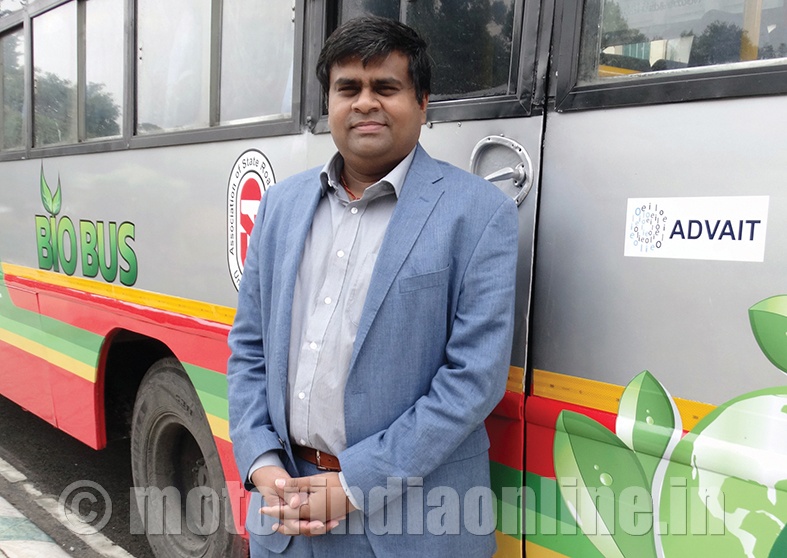The good old cooking oil now not only fries our chips, coats our chapatis and makes our curries tasty but also pumps life into trucks and buses. This, incidentally, was the dream of Dr. Rudolph Diesel, father of diesel engines in the 1890s, and other early experimenters. They dreamed of running engines on pure vegetable oils since petrol was unavailable at that time. Well, the dream did come true in the later years.
It was in the 1930s that continued research resulted in what we today call biodiesel fuel. If the biodiesel industry came up in Europe in the 1980s, the green fuel entered the Indian psyche and its public transportation (read buses) in 2015. Increasing levels of pollution have forced the Central Government to announce 35 per cent cut on carbon emissions and to work with biodiesel as one of the alternate fuels in an attempt to safeguard public health and environment.
Absolute choice
And here comes Advait Biofuel – the brainchild of Mr. Sai Dittakavi and a partner. Advait, born in 2013 in the Netherlands, is currently a major manufacturer of biodiesel from used cooking oil (UCO) with a global footprint. Being an Indian company, a valid query is why Europe and not India for Advait to be born. Mr. Dittakavi responds: “Biofuel was mostly available in Europe at that time. Here in India, it is catching up only now.”
Offering biodiesel as the single most economical and easy-to-use green fuel justifies the name Advait, which means non-dual.
Born in Visakhapatnam, Mr. Dittakavi holds an MBA degree and was exposed to biodiesel during his stint at a firm in the UK. “I have been in the biodiesel industry since 2001. It was just the start of the biodiesel in the UK and our first trial was with the London bus. Later, I was with an American company who were getting involved in biodiesel at that time.”
As the co-founder and director of the company, Mr. Dittakavi takes care of marketing and business development.
Talking about Advait’s reach around the world, he shares: “We slowly expanded our base to South America, and we already were in the Middle East. After the recent changes made in the biofuel policy, we began our operations in India. We have already signed agreements with hotels and restaurants like KFC to collect all their UCO and convert it into biodiesel. So we actually support the Swachch Bharat mission of our honourable Prime Minister.” In the UK, Advait has ventured into using UCO to generate power.
Using UCO to make biodiesel has two advantages – one, it will no more be routed back to the unregulated market comprising roadside eateries hazarding peoples’ health, especially in the Indian scenario, and the other is, being poured down the drain by numerous hotels and restaurants resulting in polluted environs.
The clientele
In India, a few State transport undertakings have agreed for Advait to supply them with biodiesel. Mr. Dittakavi confirms: “We have right now tie-ups with five STUs, namely, Maharashtra STC (MSRTC), BEST, Navi Mumbai Municipal Transport (NMMT), Telangana SRTC (TSRTC) and Karnataka SRTC (KSRTC). Except for TSRTC and KSRTC, we are yet to start supplying to the others. But BEST, NMMT and MSRTC are going ahead with a full-fledged program. We need to set up separate tanks, so operationally it will take some time.”
In India currently the mandate is to mix 20 per cent biodiesel with 80 per cent of petro diesel, which is coined as B20.
Around the world, the company supplies to Greenergy Fuels based in the UK, Petrotec and Mitsui in Germany, and Mercuria in Switzerland, to name a few.
Waste to energy
The world over, biodiesel has helped reduce pollution levels. The ‘dirty’ diesel engines can now literally clean up by mixing biodiesel by emitting significantly less particulate matter or the black smoke from exhaust pipes, sulphates, CO2 and other noxious gases.
Mr. Dittakavi assures: “Though in biodiesel nitrous oxide emissions will be there, it will be far less when compared to diesel. Since biodiesel has no sulphur, its emission should come down by 40-50 per cent and carbon by 30-40 per cent if we are using B20. But the blending ratio is upto each STU.”
So will it require any modifications to the engine?
He answers: “The engine will need no modification because the blending is not 100 per cent. Slowly it can go upto 100 per cent, but it will take a couple of years. The oxygen in biodiesel naturally cleans up the filter and removes carbon and sulphur deposits from the engine, which may have collected from using conventional diesel. So the filter must be replaced for the first time. The engine performance will actually increase, making it perhaps the best lubricant for the vehicles.”
According to Mr. Dittakavi, the 2-3 per cent residue after converting UCO to biodiesel will also be used as burning fuel in industries, leaving nothing to go waste. He says: “Now the third generation technology has come in for biodiesel production, which is called renewable diesel, but it’s as good as diesel. It has the same specifications of diesel with zero emissions. But the technology is still being developed. Right now it costs about a billion dollars to set up a unit.”
Biodiesel generated from UCO is currently trading at $1,000, nearly double the diesel cost, whereas in India Advait is supplying it Rs. 5 less than the diesel price, the reason being that in India currently there is no tax on biodiesel unlike in Europe.
End-to-end solution
Advait plans to control the entire supply chain. Currently, Advait is present in four States, and there are plans to go for pan-India presence in the coming months.
He points out: “We are the only ISCC certified (International Sustainability & Carbon Certification) collectors of UCO in India. We have the collection yards and in every city we have also the storage facility. We have a plant each in Rajamundry, Visakhapatnam and Hyderabad. We would like to be self-sufficient and also convert 100 per cent waste into biodiesel. Our main challenge is that most of the time biodiesel is uneconomical because it is based on international edible oil prices. So if we are doing our own collection of UCO, we are in better control.”
Also, Advait is open to appoint franchises in different cities who will undergo their specific training and who will need to collect the UCO under their banner.
Smooth sailing
On an average, in a month Advait Biofuels requires close to 15,000 tons of UCO. Mr. Dittakavi shares: “Compared to Saudi Arabia where we get 6,000 tons and 1,000 tons in the UAE, collecting in India is easier and in larger quantities because of our population.”
Hence, by early 2016 the company plans to start collections in all the major cities in India to meet the target amount of raw material.
So next when you are either in Telangana or Karnataka and prefer chips to munch on while travelling by their STU buses, you will know that it is the oil in both of them that is making your journey worth your while.

